The 2013 MacBook Air Review (13-inch)
by Anand Lal Shimpi on June 24, 2013 12:01 AM ESTCPU Performance
To measure CPU performance we begin with a fairly standard measure of system responsiveness: boot time. With the last generation of upgrades to 6Gbps SATA, we saw a good decrease in boot time over the previous generation platforms. The new 13-inch MBA's PCIe SSD takes the crown as it boots ever so slightly quicker than last year's setup. In practice the difference is subtle, but something you can appreciate as the 2013 MBA's IO is just snappier all over.
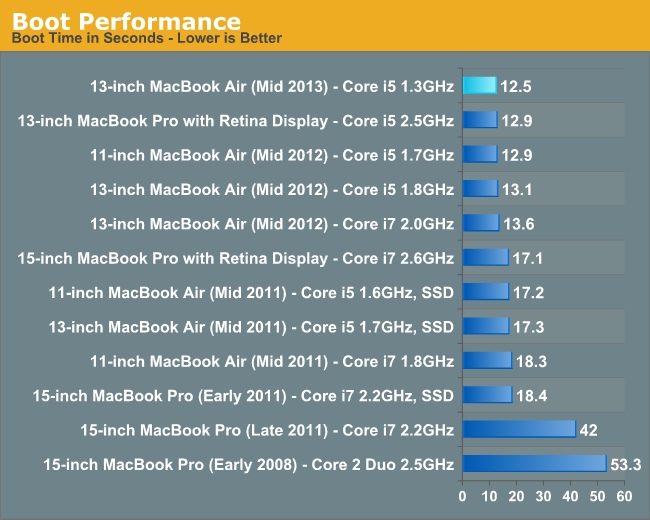
These next two charts look at single and multithreaded floating point performance using Cinebench 11.5. This test also gives us the rare opportunity of comparing to some older Mac Pro hardware as well from 2008 - 2010. Single threaded performance remains extremely important to overall system responsiveness, so it's always good to look at. As we found in our initial look at the new MBA, the 1.3GHz Core i5 CPU ends up performing about the same as last year's 1.8GHz part. I'd like to say it's all because of cooling and turbo boost, but in all likelihood Apple is trading some of Haswell's IPC gains for frequency here - enabling identical performance, at lower clocks thanks to Haswell's more efficient architecture.
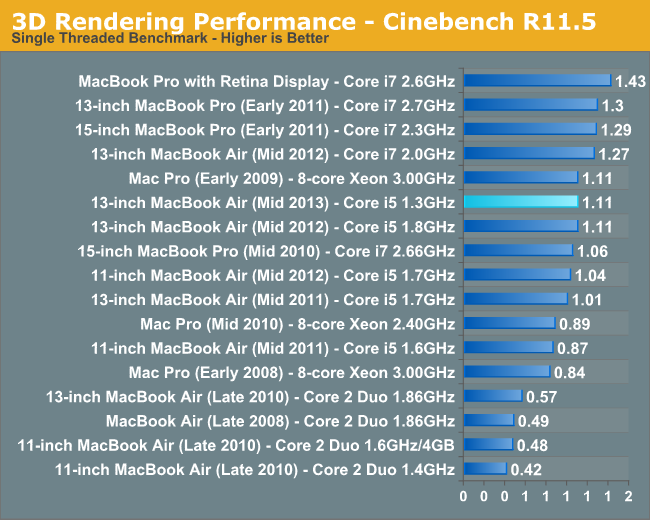
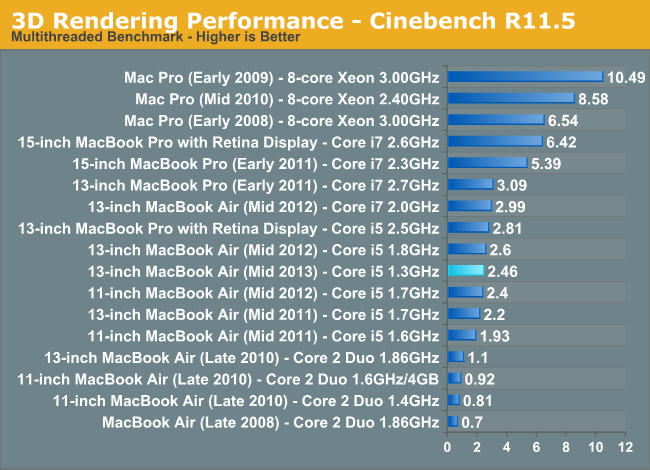
The multithreaded performance story is a bit different. The 1.3GHz i5 regresses in performance by about 5%. Overall performance is still quicker than the 2011 models, as well as the i7 based 11-inch MBA from 2012. Here we're simply seeing the 15W TDP limits come into play. Sharing both PCH and dual-core CPU power in a lower thermal footprint than last year's CPU alone is responsible for what we see above.
Video transcoding is really best suited for the higher end machines, but that doesn't change the fact that it's done on MacBook Airs as well. We'll start by looking at performance under iMovie. Here we're importing 1080p video from a Nikon D7000 and optimizing it during import.
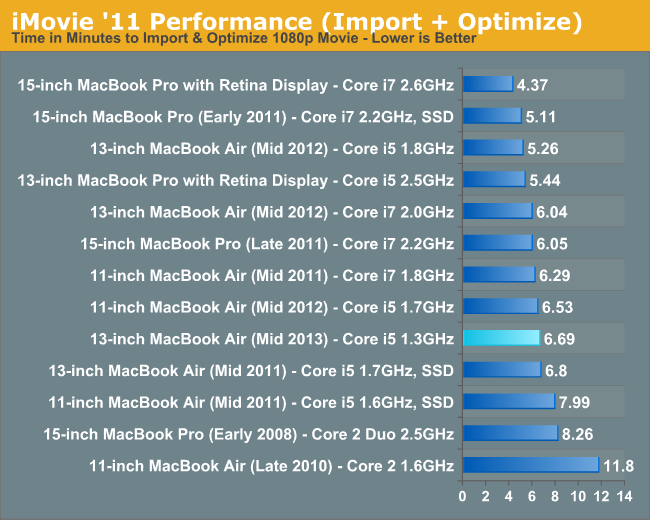
The 13-inch 1.3GHz Core i5 configuration performs similarly to last year's 11-inch 1.7GHz config. It's an interesting comparison because the 11-inch 2012 model is more thermally constrained than the 13-inch 2012 model, which is exactly what we see when we compare the 2013 13-inch MBA to the 2012 13-inch MBA. In this case the 2013 model is a hair quicker than the 2011.
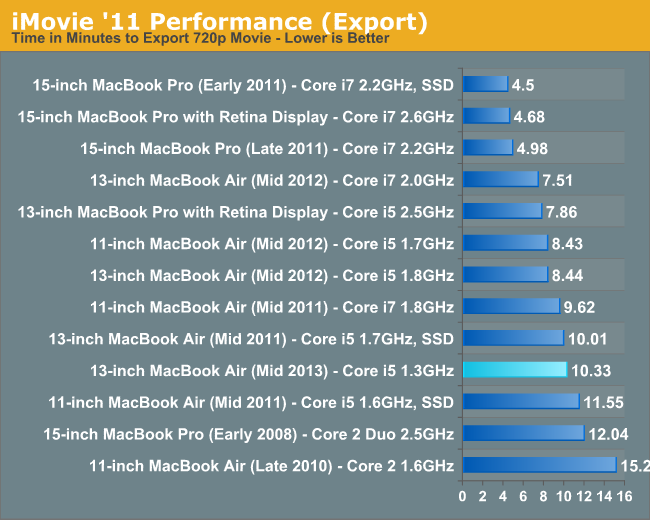
We see a similar story for a full video export. The 1.3GHz 2013 MBA slots in behind the 2011 model in this CPU bound test.
Final Cut Pro X falls on the professional end of the video production spectrum. The test file is the same here, but the workload is far more strenuous.
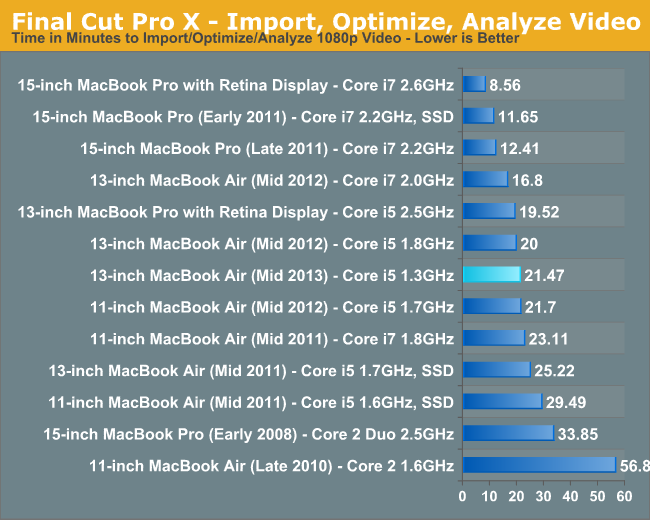
Once again, we see roughly the same performance from the 13-inch 2013 1.3GHz i5 as the 11-inch 2012 MBA. Here we do see substantially better performance than the 2011 models.
Our two photo workloads generally agree with what we saw in the video tests. The 1.3GHz Haswell part is definitely slower than th e previous generation 1.7/1.8GHz SKUs:
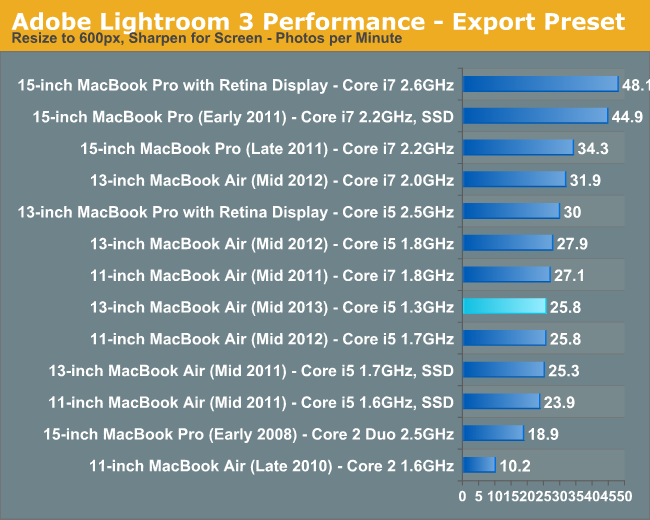
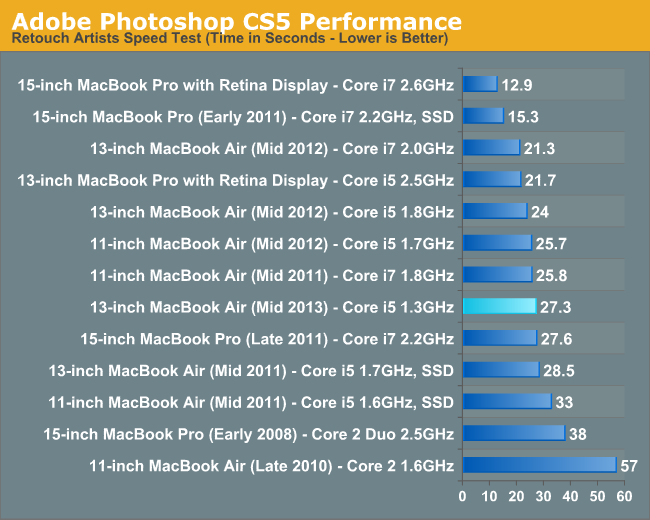
In our desktop review of Haswell I noted that performance in our compile test improved tremendously with the new architecture. As it's quite obvious that Haswell's IPC advantages don't surface all that much in our traditional suite, I wanted to see if perhaps things would be different in something that might lend itself better to Haswell's IPC improvements. I repeated our Firefox build test but under OS X. It's a multithreaded compile, with the number of threads set to 2x the number of cores (not threads) in a system. Unfortunately I came up with this bright idea while traveling, so I only had access to three machines: the 2013 13-inch MBA, the 15-inch rMBP and a 2GHz Core i7 2012 13-inch MBA. I'll add more results later, but I'm expecting this to be a part of our test suite going forward.
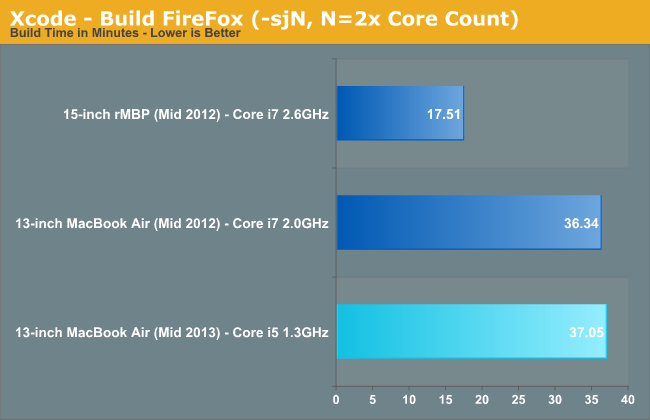
The combination of Haswell and a really fast SSD appears to help narrow the gap between the much higher clocked 2012 model and the base 2013 13-inch MBA. Here the faster Ivy Bridge CPU is less than 2% quicker. I'll reserve final judgements until I get my hands on the 1.7GHz Core i7 model, but my guess is this is an example of the best case scenario for Haswell where you get equivalent performance to a higher clocked Ivy Bridge part but with much better thermal/noise/battery life characteristics. For example, the fan was never audible on the 2013 MBA while running this test compared to running at a very noticeable volume on the 2012 Core i7 model. The same goes for temperatures. The i7 2012 model tends to run about 5% warmer along the bottom of the chassis compared to the 2013 i5.










233 Comments
View All Comments
Sm0kes - Monday, June 24, 2013 - link
I would presume that the rMBP's would get the Thunderbolt 2 refresh if they are released around the same time.mikk - Monday, June 24, 2013 - link
Do I miss something or isn't there an info about the exact memory configuration? In particular important for iGPU tests.darwinosx - Monday, June 24, 2013 - link
Nobody is going to take such an immature poorly written post seriously. It screams high school kid whose daddy buys his laptop on sale at best Buy.Subyman - Monday, June 24, 2013 - link
Fantastic read as always. Great job finding the ac file transfer culprit. Maybe some consulting work from Apple is in the future? :)helloworldv2 - Monday, June 24, 2013 - link
I bought the i7 version with 8GB ram and and 512GB SSD. I think with real world usage (some browsing, mail on, a little office, running some terminal stuff that utilizes both cores 100% for an hour or so), battery life is something like 5-7 hours. Pretty good, but rather disappointing in the light of the advertised 12 hours. It's by no means an 'all day computer'..secretmanofagent - Monday, June 24, 2013 - link
Did you read what Apple said? 12 hours is for the i5 13" MBA.http://www.apple.com/macbook-air/features.html
"Testing conducted by Apple in May 2013 using preproduction 1.3GHz dual-core Intel Core i5-based 13-inch MacBook Air units and preproduction 1.3GHz dual-core Intel Core i5-based 11-inch MacBook Air units. The wireless web test measures battery life by wirelessly browsing 25 popular websites with display brightness set to 12 clicks from bottom or 75%. The HD movie playback test measures battery life by playing back HD 720p content with display brightness set to 12 clicks from bottom or 75%. The standby test measures battery life by allowing a system, connected to a wireless network, to enter standby mode with Safari and Mail applications launched and all system settings left at default. Battery life varies by use and configuration. See www.apple.com/batteries for more information."
Would be a shame to have to read, though.
helloworldv2 - Monday, June 24, 2013 - link
I did read it. I knew I wouldn't get 12 hours out of it with normal use. However, I was expecting more than 5 hours, that's for sure. Also, many reviews hype how amazing the battery life is. IMO it's just OK. Definitely far from amazing..Paapaa125 - Monday, June 24, 2013 - link
Are you sure you got the Haswell version? If you get only 5h with light usage using 75% brightness, something is totally wrong.helloworldv2 - Monday, June 24, 2013 - link
Yes, I'm sure. With light usage, meaning nothing but a few tabs in FF, I get maybe 7-8 hours (display in full brightness). Rather unremarkable, I would say. It's a fine machine, nonetheless. Just don't expect miracles with the battery..Paapaa125 - Monday, June 24, 2013 - link
Ah, try Safari and also set the brightness to 75%. Apple figure (12h) has been done with brightness set to 75%. This has a big impact to battery life. Set it to 50% and you might get even more.You can't compare figures which have been achieved with different brightness levels.